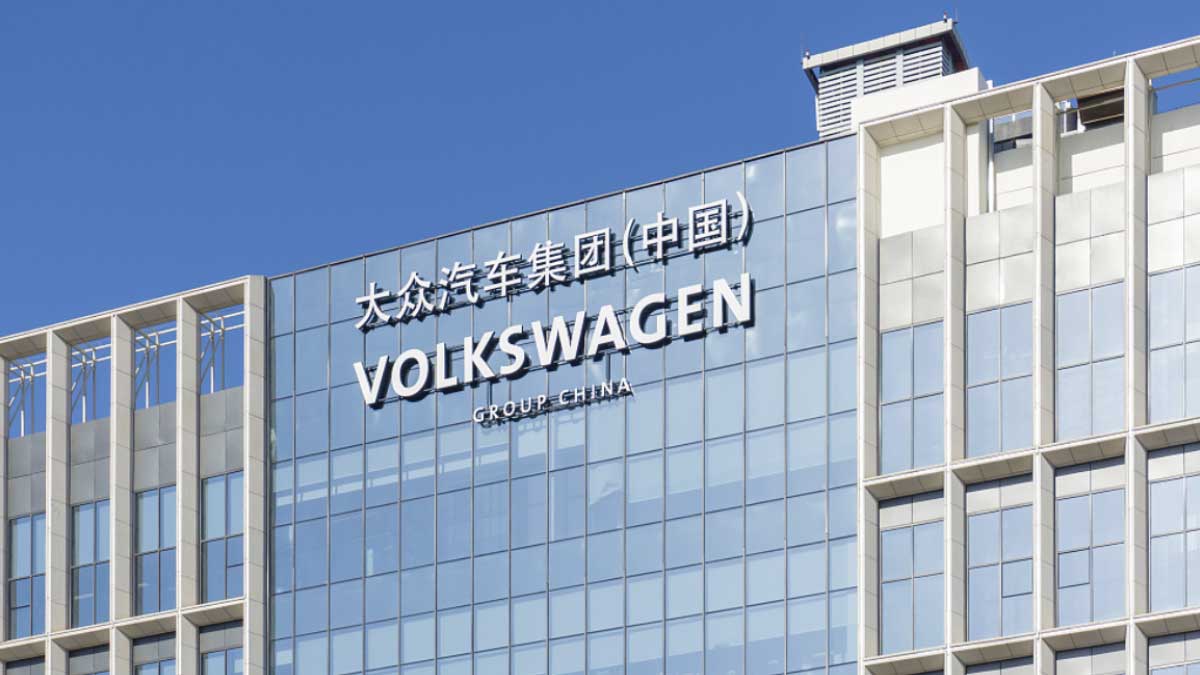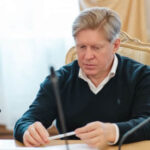- Home
- Billionaires
- Investing Newsletters
- 193CC 1000
- Article Layout 2
- Article Layout 3
- Article Layout 4
- Article Layout 5
- Article Layout 6
- Article Layout 7
- Article Layout 8
- Article Layout 9
- Article Layout 10
- Article Layout 11
- Article Layout 12
- Article Layout 13
- Article Layout 14
- Article Sidebar
- Post Format
- pages
- Archive Layouts
- Post Gallery
- Post Video Background
- Post Review
- Sponsored Post
- Leadership
- Business
- Money
- Small Business
- Innovation
- Shop
Recent Posts
Volkswagen Sells Xinjiang Plant Amid Forced Labor Allegations

Volkswagen has sold its assembly plant in the Xinjiang region of China to a government-owned firm in Shanghai, signaling a significant shift in the company’s operations after years of scrutiny over forced labor allegations. The sale, which took place on Wednesday, was made in partnership with Volkswagen’s joint venture with China’s SAIC Motor Corporation. The German automaker confirmed that the sale of its Urumqi manufacturing facility, along with two test tracks in the region, was driven by “economic reasons” as part of a broader strategic realignment of the company’s operations. The buyer, the Shanghai Motor Vehicle Inspection Center (SMVIC), is a state-owned entity, and both SMVIC and SAIC are ultimately controlled by the Shanghai government. While the financial details of the sale have not been disclosed, the move marks a major step in Volkswagen’s reorganization of its assets, particularly in light of ongoing controversies surrounding its operations in the region.
Despite years of criticism from human rights groups and Western lawmakers regarding alleged forced labor and human rights abuses in Xinjiang, Volkswagen’s official statement did not address these concerns directly. Instead, the company noted that it would continue its partnership with SAIC until 2040 and emphasized its plans to introduce a “new generation of electrified vehicles” in China by 2026, a key part of its future strategy in the country. This focus on electric vehicles aligns with the global shift toward more sustainable automotive technologies.
The sale comes after Volkswagen faced persistent pressure from human rights organizations and Western lawmakers over its ties to Xinjiang, a region that has been the focal point of allegations of severe human rights violations, including forced labor, repression of Uyghur Muslims, and other ethnic minorities. These accusations are tied to the broader geopolitical tensions between the West and China, particularly as international governments have increasingly accused Beijing of committing human rights abuses in the region. Despite these allegations, the Chinese government has vehemently denied any wrongdoing and asserts that its actions in Xinjiang are aimed at combating extremism and terrorism.
Volkswagen’s connection to Xinjiang has been a source of controversy for years, particularly as Western governments and companies have moved to distance themselves from the region in response to international sanctions and human rights investigations. In 2022, the automaker faced a “red flag” rating from Morgan Stanley Capital International (MSCI), a firm that assesses corporate performance on environmental, social, and governance (ESG) factors. This rating was issued following allegations of forced labor in Volkswagen’s Xinjiang operations. The “red flag” rating caused several ESG-focused investors to divest from Volkswagen, citing concerns about the company’s practices in the region.
In response to these accusations, Volkswagen commissioned an internal audit of its labor practices at the Urumqi plant, which was published in December 2022. The audit concluded that there was no evidence of forced labor at the facility. However, this finding has been met with skepticism by some human rights advocates and lawmakers, especially in the U.S., where the government has placed sanctions on Chinese companies accused of being involved in forced labor schemes in Xinjiang. Volkswagen’s troubles deepened in February 2023 when U.S. Customs officials blocked the import of thousands of vehicles made by its luxury brands, including Porsche, Bentley, and Audi, after discovering that an electronic component used in these vehicles was sourced from a Chinese supplier linked to forced labor. These brands, all subsidiaries of the Volkswagen Group, were implicated in the controversy due to their use of parts from the region. This led to renewed calls from U.S. lawmakers for Volkswagen to cease its operations in Xinjiang altogether, particularly in light of the U.S. government’s designation of China’s actions in Xinjiang as genocide and crimes against humanity.
The company also faced increased scrutiny after a U.S. Senate probe in May 2023 revealed that Volkswagen, along with other automakers, had purchased components from a supplier that had been sanctioned by the U.S. for its use of forced labor programs in Xinjiang. This report intensified the pressure on Volkswagen, and further raised questions about the company’s commitment to ethical business practices in the region. Adding to the complexity of the issue, in September 2023, the Financial Times reported that Volkswagen’s internal audit of its Urumqi factory did not meet international standards for labor rights investigations, further diminishing confidence in the company’s findings and response to the allegations.
Volkswagen’s operations in Xinjiang have also been at the center of broader geopolitical tensions. In recent years, the U.S., U.K., Canada, and the European Union have all imposed sanctions on Chinese companies and officials linked to the region, targeting entities accused of complicity in the human rights abuses. These sanctions have added an additional layer of pressure on multinational companies like Volkswagen, which have large business interests in China but must also navigate the growing demand for corporate responsibility on human rights issues. China, on the other hand, has pushed back strongly against these foreign criticisms, accusing countries and companies of interfering in its internal affairs. State-controlled media in China has frequently targeted foreign companies that have distanced themselves from Xinjiang. In 2021, for instance, China’s state-run media launched a campaign attacking Western fashion brands such as Nike, H&M, Adidas, and Burberry for their decision to cut ties with Xinjiang over forced labor concerns. Volkswagen’s decision to build a factory in the region, despite the growing international pressure, was also defended by Chinese media, which suggested that the company’s commitment to the Chinese market outweighed Western criticism.
In 2023, the Global Times, a state-controlled Chinese newspaper, published an opinion piece praising Volkswagen for “having the courage to build a factory in Xinjiang” despite Western pressure. This piece underscored the increasingly complex intersection of geopolitics and business operations, as companies are forced to balance international human rights expectations with their commercial interests in China, one of the largest and most important markets in the world.
Volkswagen’s decision to sell its Xinjiang plant is a clear sign of the shifting dynamics between global business operations and human rights concerns. While the company has officially framed the sale as part of a strategic realignment, it cannot escape the wider context of international scrutiny over its operations in a region where severe human rights violations have been reported. As multinational corporations continue to grapple with these complex issues, Volkswagen’s sale of the Xinjiang facility may be seen as both a response to ongoing pressure and an attempt to chart a new course in an increasingly contentious global business environment.
Recent Posts
Categories
- 193 Countries Consortium Partner1
- 193cc Digital Assets2
- 5G1
- Aerospace & Defense48
- AI37
- Arts3
- Banking & Insurance11
- Big Data3
- Billionaires930
- Boats & Planes1
- Business332
- Careers13
- Cars & Bikes79
- CEO Network1
- CFO Network17
- CHRO Network1
- CIO Network1
- Cloud10
- CMO Network18
- Commercial Real Estate7
- Consultant1
- Consumer Tech194
- CxO1
- Cybersecurity73
- Dining1
- Diversity, Equity & Inclusion4
- Education7
- Energy8
- Enterprise Tech29
- Events11
- Fintech1
- Food & Drink2
- Franchises1
- Freelance1
- Future Of Work2
- Games149
- GIG1
- Healthcare79
- Hollywood & Entertainment203
- Houses1
- Innovation46
- Investing2
- Investing Newsletters4
- Leadership65
- Lifestyle11
- Manufacturing1
- Markets20
- Media195
- Mobile phone1
- Money13
- Personal Finance2
- Policy569
- Real Estate1
- Research6
- Retail1
- Retirement1
- Small Business1
- SportsMoney42
- Style & Beauty1
- Success Income1
- Taxes2
- Travel10
- Uncategorized12
- Vices1
- Watches & Jewelry2
- world's billionaires899
- Worlds Richest Self-Made Women2
Related Articles
South Korea Plane Crash: A Tragic Loss and Global Mourning
The tragic plane crash at South Korea’s Muan International Airport on Sunday...
By 193cc Agency CouncilDecember 30, 2024H-1B Visa Debate Splits Trump Allies and Silicon Valley
The debate over H-1B visas has once again become a contentious issue,...
By 193cc Agency CouncilDecember 28, 2024Trump Moves $4B Stake in Truth Social Parent, Stock Drops 6%
Donald Trump recently transferred his 57% stake in Trump Media & Technology...
By 193cc Agency CouncilDecember 20, 2024House Rejects Trump-Backed Funding Bill, Shutdown Looms
The U.S. House of Representatives rejected a new government funding bill on...
By 193cc Agency CouncilDecember 20, 2024













Leave a comment